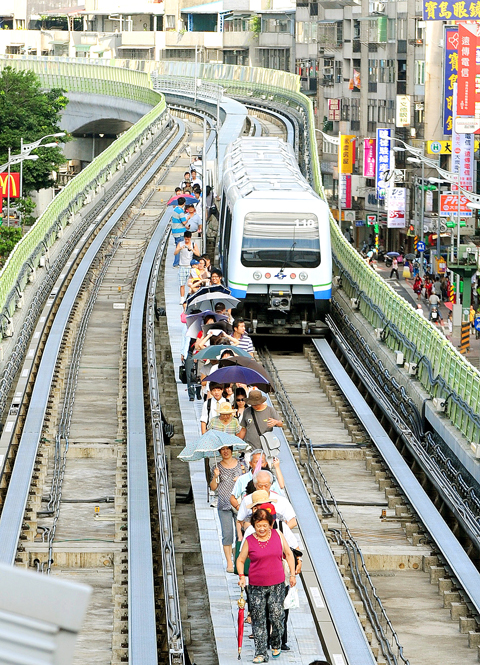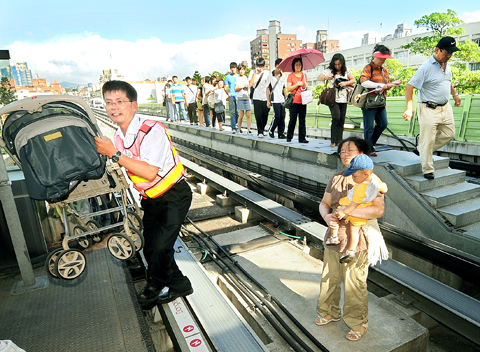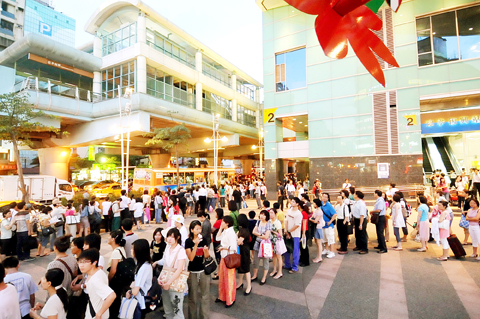The Taipei City MRT’s Neihu and Muzha lines were suspended yesterday afternoon after a sudden power outage, forcing about 700 passengers to walk down the elevated rail lines to return to station platforms after trains stopped between stations.
The lines are scheduled to resume operating at 6am today. The suspension of services yesterday was the first serious system failure on the Neihu Line since it began operations last Saturday.
A total of 21 trains running on the two lines came to a halt at 3:27pm after the control center detected a warning signal indicating a malfunction in the power supply, Taipei Rapid Transit Corp (TRTC) general manager Tsay Huei-sheng (蔡輝昇) said.

PHOTO: FANG PIN-CHAO, TAIPEI TIMES
The malfunction caused power to be cut off and the whole Brown Line was shut down, Tsay said. The company began evacuating passengers according to emergency procedures at 3:44pm after it failed to restore power, he said.
TRTC said only three trains stopped between stations — one between Neihu District’s Gangqian and Wende stations; one between Zhongshan District’s Dazhi and Jiannan stations; and one between Zhongshan District’s Zhongshan Junion High School and Songshan Airport stations.
However, Taipei Times reporters saw another train stopped between Gangqian and Wende stations, and trains stopped in both directions north of Zhongshan Junior High School Station. The TRTC declined to comment on the discrepancy.

PHOTO: FANG PIN-CHAO, TAIPEI TIMES
All passengers, including those on the trains that stopped between stations, were evacuated by 4:20pm, and the company provided free shuttle buses along the lines to take them to their destinations, Tsay said, adding that the TRTC had sent staff to evacuate passengers as soon as possible.
Some passengers from the stranded trains, however, slammed the TRTC for failing to respond to the incident promptly, leaving some waiting inside the cars for more than half an hour without air conditioning or any explanation.
“Nobody told us what happened and we were stuck inside the cars without air conditioning. Their emergency response ability is a joke,” a female passenger complained after walking back to Zhongshan Junior High School Station.

PHOTO: LU CHUN-WEI, TAIPEI TIMES
STRANDED
A Taipei Times editor, who was in the stranded train near Gangqian Station, said that passengers arriving at the station prior to the power shutdown were not able to board or alight because the doors did not open. The train then moved off and stopped a few seconds later well beyond the station. After a few moments, it started again, but then lurched to a halt, pitching passengers forward.
An announcement came over the loudspeaker that there had been an incident and that passengers should wait. Announcements, repeated every few minutes, were in Mandarin only. Several announcements were made over the next 20 minutes requesting that passengers wait “patiently.” At 25 minutes, the power and air conditioning suddenly went off. There was no announcement as to how long passengers would be expected to wait. After 30 minutes, and after receiving no instructions from MRT staff, three male passengers pried open the doors and stepped outside.
A female MRT employee ran up to the carriage from Gangqian Station. The men asked if the passengers should get off and walk to the station. She said “yes” in an exasperated tone, as if this were obvious, despite the fact that the last instruction to be issued was “wait patiently” on their own.
The staffer disappeared and no one else came to assist. Passengers alighted from the carriage, helping the infirm and elderly, before walking slowly between the two tracks back to the station. The sheer number of passengers meant that it took at least 20 minutes for them to reach Gangqian Station, no more than 200m away.
APOLOGY
Later yesterday, Taipei Mayor Hau Lung-bin (郝龍斌) apologized for the inconvenience the incident had caused the public, and demanded that Taipei city’s Department of Rapid Transit System solve the false alarms and malfunctions that have hindered the Neihu Line since its operation began less than a week ago.
“We are prioritizing our efforts on fixing the system’s false alarms and stabilizing it in the shortest time,” Hau said.
Hau acknowledged the problematic system integration of the Neihu and Muzha lines could be the reason behind the frequent malfunctions and the shutdown of the lines yesterday, but said the city government did not plan to halt the operation of the two lines to fix the problem.
The Neihu Line, an extension of the Muzha Line, was designed to be compatible with the Muzha Line’s Matra system. The Neihu Line’s builder, Montreal-based Bombardier, sent software engineers to inspect the computer systems and improve the detection of false alarms last month.
Hau said the city government would ask Bombardier for compensation according to contract if the company fails to solve the system malfunctions.
Department Commissioner Tom Chang (常歧德) said his department and Bombardier were working to fix the problems and seeking to have the lines resume operation as soon as possible.
In compensation, the firm gave free one-day MRT passes and bus tickets to passengers who had to walk along the tracks to get back to the stations. The Taipei City’s Transportation Department will continue to provide free shuttle buses along the lines today, Tsay said.

DAREDEVIL: Honnold said it had always been a dream of his to climb Taipei 101, while a Netflix producer said the skyscraper was ‘a real icon of this country’ US climber Alex Honnold yesterday took on Taiwan’s tallest building, becoming the first person to scale Taipei 101 without a rope, harness or safety net. Hundreds of spectators gathered at the base of the 101-story skyscraper to watch Honnold, 40, embark on his daredevil feat, which was also broadcast live on Netflix. Dressed in a red T-shirt and yellow custom-made climbing shoes, Honnold swiftly moved up the southeast face of the glass and steel building. At one point, he stepped onto a platform midway up to wave down at fans and onlookers who were taking photos. People watching from inside

A Vietnamese migrant worker yesterday won NT$12 million (US$379,627) on a Lunar New Year scratch card in Kaohsiung as part of Taiwan Lottery Co’s (台灣彩券) “NT$12 Million Grand Fortune” (1200萬大吉利) game. The man was the first top-prize winner of the new game launched on Jan. 6 to mark the Lunar New Year. Three Vietnamese migrant workers visited a Taiwan Lottery shop on Xinyue Street in Kaohsiung’s Gangshan District (崗山), a store representative said. The player bought multiple tickets and, after winning nothing, held the final lottery ticket in one hand and rubbed the store’s statue of the Maitreya Buddha’s belly with the other,

‘NATO-PLUS’: ‘Our strategic partners in the Indo-Pacific are facing increasing aggression by the Chinese Communist Party,’ US Representative Rob Wittman said The US House of Representatives on Monday released its version of the Consolidated Appropriations Act, which includes US$1.15 billion to support security cooperation with Taiwan. The omnibus act, covering US$1.2 trillion of spending, allocates US$1 billion for the Taiwan Security Cooperation Initiative, as well as US$150 million for the replacement of defense articles and reimbursement of defense services provided to Taiwan. The fund allocations were based on the US National Defense Authorization Act for fiscal 2026 that was passed by the US Congress last month and authorized up to US$1 billion to the US Defense Security Cooperation Agency in support of the

HIGH-TECH DEAL: Chipmakers that expand in the US would be able to import up to 2.5 times their new capacity with no extra tariffs during an approved construction period Taiwan aims to build a “democratic” high-tech supply chain with the US and form a strategic artificial intelligence (AI) partnership under the new tariffs deal it sealed with Washington last week, Taipei’s top negotiator in the talks said yesterday. US President Donald Trump has pushed Taiwan, a major producer of semiconductors which runs a large trade surplus with the US, to invest more in the US, specifically in chips that power AI. Under the terms of the long-negotiated deal, chipmakers such as Taiwan Semiconductor Manufacturing Co (TSMC, 台積電) that expand US production would incur a lower tariff on semiconductors or related manufacturing